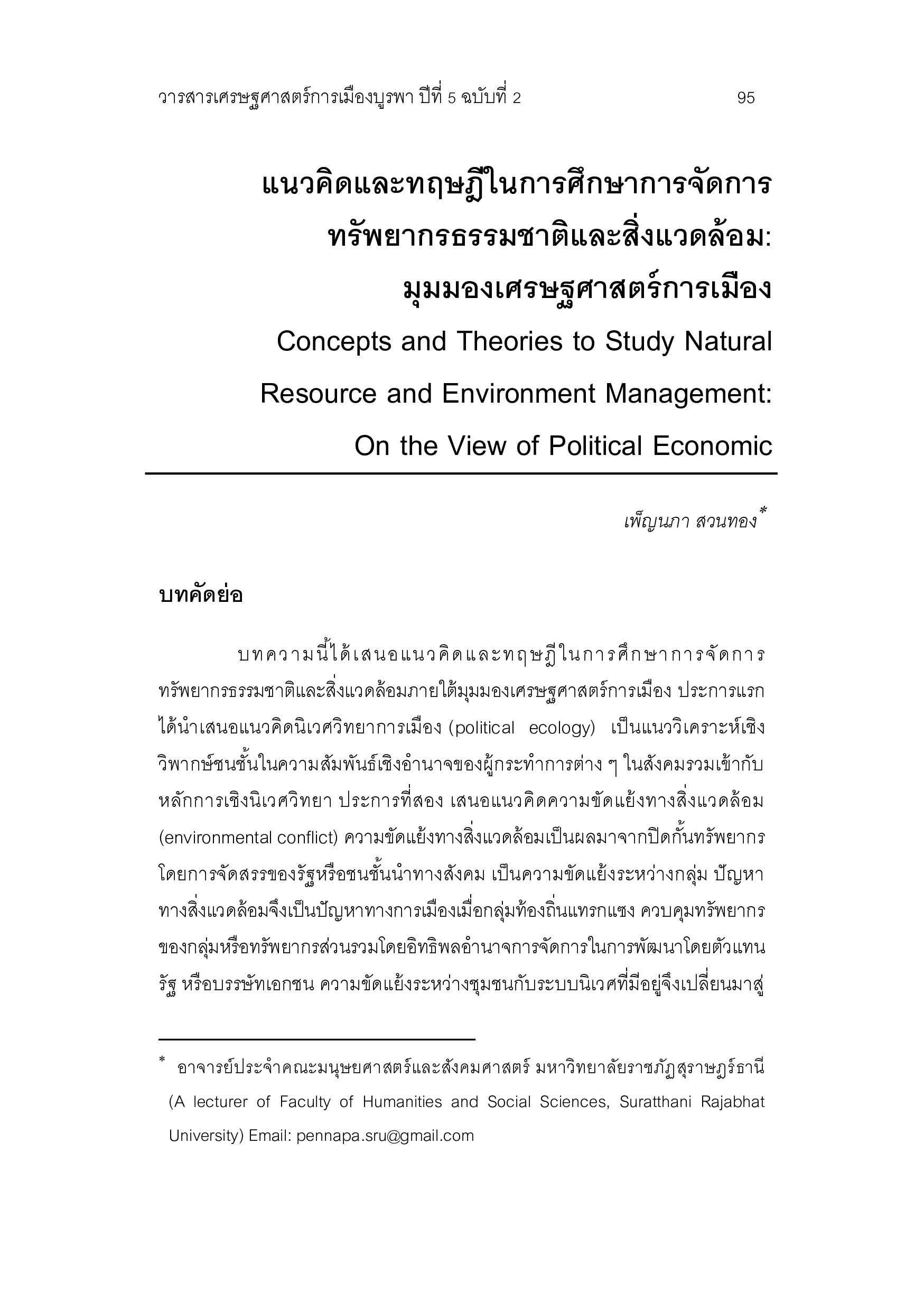Concepts and Theories to Study Natural Resource and Environment Management: On the View of Political Economic
Keywords:
Political Ecology, Resources Management, Environmental Conflict, Political EconomicAbstract
This article presented the Concepts and Theories to study natural resource and environment management by using the view of political economic. First of all it presented concept of Political Ecology which was an critical analysis on racist power relations of the political objects and actors with ecology concept. Secondly it presented the concept on Environmental Conflict, the conflict on environment which was the result from natural resource blocking by government allocated or social leader. It was the conflict among genders, class, or ethnicity. The environment problems were political problems when the local groups of people were intervened and controlled the natural resource or environment of the group of people by using the power in managing through the government representative or the private companies. The conflict between community and ecology system was changed to conservation or environment development policy by government. So the conflict was involved with the rights of using environment, access rights, withdrawal rights, management rights, exclusion rights, and alienation rights. This was from the change of conservation and development policy. Finally it was to raise the topic of the research on the environment to study and solve the environment problems which would bring to social justice and sustainable ecology.
References
เอกสารภาษาไทย
กนกศักดิ์ แก้วเทพ. (บก.). (2550). มรรควิธีเศรษฐศาสตร์การเมือง (1). กรุงเทพฯ: จุฬาลงกรณ์มหาวิทยาลัย.
จิรากรณ์ คชเสนี. (2556). นิเวศพัฒนาเพื่อความยั่งยืน. กรุงเทพฯ: จุฬาลงกรณ์มหาวิทยาลัย.
ไชยณรงค์ เศรษฐเชื้อ. (2543). นิเวศวิทยาการเมืองของการสร้างเขื่อนขนาดใหญ่ในประทศไทย: กรณีศึกษาโครงการเขื่อนแก่งเสือเต้น. วิทยานิพนธ์ศิลปศาสตรมหาบัณฑิต, สาขาวิชาการจัดการสิ่งแวดล้อม, บัณฑิตวิทยาลัย, มหาวิทยาลัยเชียงใหม่.
ณฐพงศ์ จิตรนิรัตน์. (2546). การมีส่วนร่วมของกลุ่มประชาคมในการพัฒนาการปกครองท้องถิ่นของสงขลา. วารสารมหาวิทยาลัยทักษิณ, 6 (2): 30-34.
ปรีชา เปี่ยมพงศ์สานต์. (2541). นิเวศเศรษฐศาสตร์และนิเวศวิทยาการเมือง. กรุงเทพฯ: จุฬาลงกรณ์มหาวิทยาลัย.
อานันท์ กาญจนพันธุ์. (2543). “สิทธิในการเข้าถึงทรัพยากร : สถานภาพการศึกษาเกี่ยวกับวิธีคิด”. ใน พลวัตของชุมชนในการจัดการทรัพยากร: กระบวนทัศน์และนโยบาย. กรุงเทพฯ: สำนักงานกองทุนสนับสนุนการวิจัย.
_______. (2544). วิธีคิดเชิงซ้อนในการวิจัยชุมชน พลวัตและศักยภาพของชุมชนในการพัฒนา. กรุงเทพฯ: สำนักงานกองทุนสนับสนุนการวิจัย.
เอกสารภาษาต่างประเทศ
Bryant. R. L. (1992). Political ecology: An emerging research agenda in Third-World studies. Political Geography. 11 (1).
Ostrom, E. (1990). Governing the Commons: The Evolution of Institutions for Collective Action. New York: Cambridge University Press.
_______. (2000). Private and Common Property Rights. In Bouckaertand, B. & Geest, G. de. (eds.). Encyclopedia of Law and Economics Vol. II: Civil Lawand Economics. Cheltenham: Edward Elgar.
_______. (2008). Design principles of robust property-right: What have we learned?. In Ingram, K. G. & Hong, Y. H. (eds). Property right and land policies. Cambridge: Lincoln Institute of Land Policy.
Robbins, P. (2004). Political Ecology. Massachusetts. Blackwell Publishing.
_______. (2012). Political Ecology. (2nd ed.) New York: John Wiley & Sons.
Schlager, E. & Ostrom, E. (1992). The Formation of Property Right in Susan Hanna. In Folke, C. & Marler, K. G. (eds). Right to Nature: Ecology, Economic, Cultural and Political Principles of Institutions for the Environment. Washington D.C.: Island Press.






